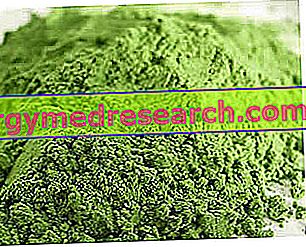Generality
What is there to know about the swollen belly?
The swollen belly is a typical symptom of many diseases or disorders of the digestive system.
This is an unpleasant sensation of excessive abdominal tension, expression of a gas accumulation in the stomach and intestines.
The swollen belly - often referred to as meteorism - is generally accompanied by alterations in the frequency of evacuation (constipation or diarrhea), abdominal cramps, flatulence and belching.
Often, the swollen belly is a passing symptom, caused for example by a meal that is too abundant or consumed voraciously, or by an increase in weight. On the other hand, abdominal bloating is a symptom of physiological phenomena, such as premenstrual syndrome and menopause. In other cases, the swollen belly hides more important pathologies, such as: appendicitis, colon and ovarian cancer, gall bladder stones, cystic fibrosis, viral / bacterial gastroenteritis, food intolerances (eg celiac disease), irritable bowel syndrome etc.
The published material is intended to allow quick access to general advice, suggestions and remedies that doctors and textbooks are used to dispense for the treatment of swollen belly; these indications must in no way replace the opinion of the attending physician or other health specialists in the sector who are treating the patient.
Meteorism: What it is and Possible Causes »Fighting Meteorism: Where to Start? »Drugs for the treatment of meteorism» Meteorism Diet: What to do? »Natural Remedies Against Meteorism»What to do
What to do in case of a swollen belly?
- Paying particular attention to the correct combination of foods is an excellent remedy to "deflate" the swollen belly more quickly
- In the case of lactose intolerance, the only effective remedy to avoid belly swelling is to remove all foods containing lactose from the diet
- In the case of gluten intolerance (celiac disease), following a gluten-free diet is the only food remedy to reduce the symptoms derived from the pathological condition (including the swollen belly)
- Lose weight. The increase of a few pounds can cause an unpleasant sensation of abdominal tension
- Eat slowly and in moderation
- Don't talk while eating
- Take yogurt with live lactic ferments or a probiotic in case of antibiotic therapy (useful for treating meteorism dependent on bacterial gastroenteritis)
- Maintain a moderate intake of fiber and a good level of hydration (drink at least 2 liters of water per day)
- In the absence of lumbo-sacral pathologies such as lumbago, hernias etc., a good remedy to reduce meteorism is to "train the belly" by twisting the body with a stick. The exercise consists in slightly tilting the trunk forward, rotating from right to left (and vice versa) a stick that rests behind the head, above the shoulders
- Reduce stress. Although discounted, decreasing daily tensions is an excellent remedy to relieve abdominal bloating due to excessive stress
- Follow yoga, pilates or any other form of relaxation
- Practice constant physical exercise: sport is a particularly effective remedy for both mood and to alleviate belly swelling
- Contact your doctor immediately if together with the abdominal swelling, other potentially serious symptoms are observed such as high fever, severe diarrhea, poor appetite, increased abdominal tenderness on palpation
- If necessary, take non-absorbable antibiotics that exert their rebalancing action on the bacterial flora at the enteric level without being absorbed by the intestine.
What Not To Do
What not to do in case of a swollen belly?
- Overeat. Big binges are the worst enemies of a swollen belly
- Follow an unbalanced diet, characterized by excesses, hyperlipid foods and "junk" foods
- Abusing heteropolysaccharide-based laxatives (fibers): these products (including herbal products) swell at the gastro-intestinal level, favoring the swollen belly
- Lie down immediately after a meal
- Drink carbonated drinks
- Chewing gum or sucking too much candy can promote abdominal swelling
- Drinking with a straw or sipping the surface of a hot drink can increase the sense of a swollen belly. With this attitude, in fact, even air is unknowingly ingested
- Combine many foods together (eg pasta, meat, fish and desserts)
- sedentary
- Depression, anxiety and stress accentuate abdominal tension
- Smoking during meals.
What to eat
What to eat in case of a swollen belly?
- Take lots of fruit and vegetables, as it is rich in antioxidants (vitamin C and E)
- If necessary, control hunger preferring whole foods (pasta, rice) and rich in fiber
- Allow yourself a sugary fruit away from meals, since these foods favor the fermentation of the foods to which they are associated
- Associate proteins with vegetables (not fried)
- Fennel: favors the expulsion of gases
- Mint: decreases fermentation and swollen belly
- Apple: intervenes in the regulation of intestinal fermentation
- Blueberry: has antifermentative properties.
What NOT to Eat
What NOT to eat in case of a swollen belly?
- Avoid eating difficult-to-digest foods, such as dips, fries, spicy and fat-rich foods
- Avoid (or limit as much as possible) the consumption of foods that can induce flatulence, such as legumes: chickpeas, lentils, peas, beans, green beans
- Cabbage, onions, aubergines, yeasts, carrots
- Milk and dairy products: limiting the consumption of milk and dairy products is an excellent remedy to alleviate or prevent abdominal bloating in lactose intolerant individuals
- Soft drinks, sweets and artificial sweeteners: fermenting in the intestine, these foods promote or aggravate the perception of a swollen belly
- The combinations "Milk + eggs" as well as "legumes + meat" are not recommended in case of a swollen belly
- Complex foods (which, forcing the gastrointestinal system to a super digestive work, slow down digestion)
- Whipped cream, milkshakes, smoothies, mayonnaise and puff pastry (they contain air, therefore they can aggravate the feeling of a swollen belly)
- Soft bread / bread crumbs.
Natural Cures and Remedies
Cures and natural remedies for swollen tummy
- Coal - vegetable, animal, compound and medicated officinale - is the most well-known and effective herbal remedy to counteract the swollen non-pathological belly. Coal is the only substance capable of absorbing gases. It boasts extraordinary adsorbent properties, such as to incorporate excess swallowed air with food
- Carminative plants also contribute to reducing the abdominal swelling that characterizes meteorism. Unlike coal, these drugs exert their therapeutic action against the swollen belly by eliminating (and not adsorbing) the gases:
- Cumin → carminative, digestive and antimicrobial properties
- Anise ( Pimpinella anisum ) → carminative, digestive and antimicrobial properties
- Fennel ( Foeniculum vulgare ) → stimulating action on the motility of the stomach and intestines, anti-fermentation activity
- Angelica ( Angelica archangelica ) → spasmolytic, prokinetic and carminative activities
- Mint ( Mentha piperita ) → spasmolytic, digestive, antiseptic properties
- Lemon balm ( Melissa officinalis ) → relaxing, digestive, antibacterial, anti-inflammatory, antispasmodic properties
- Chamomile ( Chamomilla recutita ) → spasmolytic, anti-inflammatory and antibacterial
- Supplementing the diet with natural products formulated with fiber can be a good remedy for treating a swollen belly (even if, carefully, excess fiber can favor it):
- Agar agar
- glucomannan
- Guar gum
- Psyllium pectins
- Rubber Karaya
- Glutamine: fundamental nutrient for enterocytes (cells of the intestinal mucosa from which the correct selectivity and intestinal absorption capacity depends).
Pharmacological care
Pharmacological treatment against swollen belly
It is not always necessary to resort to pharmacological specialties to remedy swollen belly. More often than not, it is sufficient to follow a healthy and balanced diet, associated with a regular sports practice. However, some patients resort to the use of drugs, which should always be taken with moderation and common sense, subject to medical advice / prescription:
- Parasympathetic-mimetic drugs (muscarinic agonists): favoring peristalsis, these drugs speed up the removal of intestinal gas
- Bethanecol (eg Myocholine)
- Anti-foam drugs + antacids:
- Dimethicone (eg Simecrin, Meteosim)
- Probiotic supplements: useful remedy in case of swollen belly. Being able to regularize intestinal activity, these drugs favor the engraftment of symbiont bacterial flora.
Prevention
Prevent the swollen belly
The best remedy for swollen belly care is prevention. In the absence of underlying pathologies, it is possible to prevent the swollen belly simply by following a healthy and balanced diet, respecting what is dictated by food education and performing regular exercise. Adopting a correct breathing technique (see abdominal breathing) can help reduce swelling thanks to the intestinal massage constantly exercised by the diaphragm during breathing.
Medical Treatments
Medical treatments for swollen belly
Generally, no specific medical treatment is needed to remedy abdominal bloating. However, the patient with a swollen belly may undergo a targeted medical intervention in the following circumstances:
- Intestinal obstruction: requires surgical treatment consisting in the removal of all intestinal parts in necrosis
- Colon / ovarian cancer: requires radio / chemotherapy and / or surgical treatment
- Appendicitis: requires appendectomy
Gall bladder stones: requires cholecystectomy.



